Related Research Articles
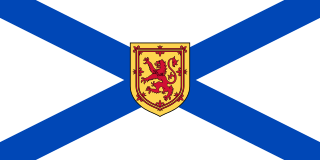
Nova Scotia is one of the thirteen provinces and territories of Canada. It is one of the three Maritime provinces and one of the four Atlantic provinces. Nova Scotia is Latin for "New Scotland".
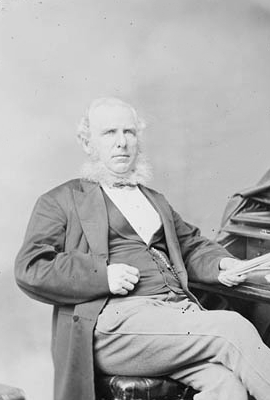
Jonathan McCully was a participant at the Confederation conferences at Charlottetown, Quebec City, and in London, and is thus considered one of the Fathers of Canadian Confederation. He did much to promote union through newspaper editorials. For his efforts, he received a Senate appointment. He later became a judge of the Nova Scotia Supreme Court.

Halifax is the capital and most populous municipality of the Canadian province of Nova Scotia, and the most populous municipality in Atlantic Canada. As of 2022, it is estimated that the population of the Halifax CMA was 480,582, with 348,634 people in its urban area. The regional municipality consists of four former municipalities that were amalgamated in 1996: Halifax, Dartmouth, Bedford, and Halifax County.

Mary Jane Lamond is a Canadian Celtic folk musician who performs traditional Canadian Gaelic folk songs from Cape Breton Island. Her music combines traditional and contemporary material. Lamond is known as the vocalist on Ashley MacIsaac's 1995 hit single "Sleepy Maggie", and for her solo Top 40 hit "Horo Ghoid thu Nighean", the first single from her 1997 album Suas e!. Her 2012 collaboration with fiddler Wendy MacIsaac, Seinn, was named one of the top 10 folk and americana albums of 2012 by National Public Radio in the United States.

Province House in Halifax is where the Nova Scotia legislative assembly, known officially as the Nova Scotia House of Assembly, has met every year since 1819, making it the longest serving legislative building in Canada. The building is Canada's oldest house of government. Standing three storeys tall, the structure is considered one of the finest examples of Palladian architecture in North America.

William Joel MacDonald Plaskett is a Canadian rock musician and songwriter based in Halifax, Nova Scotia. He was a member of Halifax alternative rock band Thrush Hermit in the 1990s. Plaskett performs in a number of genres, from blues and folk to hard rock, country, and pop.

Joseph Barss was a sea captain of the schooner Liverpool Packet and was one of the most successful privateers on the North American Atlantic coast during the War of 1812.

Rover was a privateer brig out of Liverpool, Nova Scotia, known for several bold battles in the Napoleonic Wars.

Bruce Guthro was a Canadian singer-songwriter from Cape Breton Island, Nova Scotia. Guthro recorded as a solo artist, and was lead vocalist for the Scottish Celtic rock band Runrig from 1998, until the group retired in 2018. Guthro received several ECMAs, and hosted and conceptualized the Canadian TV show Songwriters Circle, on which guests included Jim Cuddy, Colin James, and Alan Doyle.

Myles Francis Goodwyn was a Canadian musician. He was the lead vocalist, guitarist, and principal songwriter of the rock band April Wine. He released 16 studio albums with April Wine, and four albums as a solo artist. Goodwyn led the group from its inception and garage band roots to its multiplatinum sales peak. He received the National Achievement Award at the 2002 SOCAN Awards, an ECMA Lifetime Achievement Award, and was inducted into the Canadian Songwriters Hall of Fame. He was inducted into Canada's Walk of Fame and the Canadian Music Hall of Fame as a member of April Wine.

The history of Nova Scotia covers a period from thousands of years ago to the present day. Prior to European colonization, the lands encompassing present-day Nova Scotia were inhabited by the Mi'kmaq people. During the first 150 years of European settlement, the region was claimed by France and a colony formed, primarily made up of Catholic Acadians and Mi'kmaq. This time period involved six wars in which the Mi'kmaq along with the French and some Acadians resisted the British invasion of the region: the French and Indian Wars, Father Rale's War and Father Le Loutre's War. During Father Le Loutre's War, the capital was moved from Annapolis Royal, Nova Scotia, to the newly established Halifax, Nova Scotia (1749). The warfare ended with the Burying the Hatchet ceremony (1761). After the colonial wars, New England Planters and Foreign Protestants immigrated to Nova Scotia. After the American Revolution, Loyalists immigrated to the colony. During the nineteenth century, Nova Scotia became self-governing in 1848 and joined the Canadian Confederation in 1867.
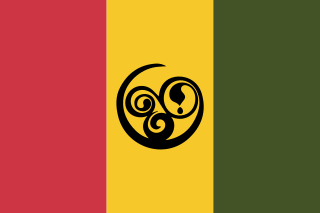
Black Nova Scotians are an ethnic group consisting of Black Canadians whose ancestors primarily date back to the Colonial United States as slaves or freemen, later arriving in Nova Scotia, Canada, during the 18th and early 19th centuries. As of the 2021 Census of Canada, 28,220 Black people live in Nova Scotia, most in Halifax. Since the 1950s, numerous Black Nova Scotians have migrated to Toronto for its larger range of opportunities. The first recorded free African person in Nova Scotia, Mathieu da Costa, a Mikmaq interpreter, was recorded among the founders of Port Royal in 1604. West Africans escaped slavery by coming to Nova Scotia in early British and French Colonies in the 17th and 18th centuries. Many came as enslaved people, primarily from the French West Indies to Nova Scotia during the founding of Louisbourg. The second major migration of people to Nova Scotia happened following the American Revolution, when the British evacuated thousands of slaves who had fled to their lines during the war. They were given freedom by the Crown if they joined British lines, and some 3,000 African Americans were resettled in Nova Scotia after the war, where they were known as Black Loyalists. There was also the forced migration of the Jamaican Maroons in 1796, although the British supported the desire of a third of the Loyalists and nearly all of the Maroons to establish Freetown in Sierra Leone four years later, where they formed the Sierra Leone Creole ethnic identity.
MCJ and Cool G were a seven time Juno Award–nominated Canadian hip hop duo from Halifax, Nova Scotia. The duo were James McQuaid (MCJ), originally part of the Halifax hip hop group New Beginning, and Richard Gray. MCJ was the rapper and Cool G mostly sang the choruses. Their sound was new jack swing which was popular at the time. Mcj and Coolg have a lifetime achievement award from ANSMA and a pioneer award from the ECMAS Coolg is owner of Pyoor entertainment and host of his own podcast "so listen"
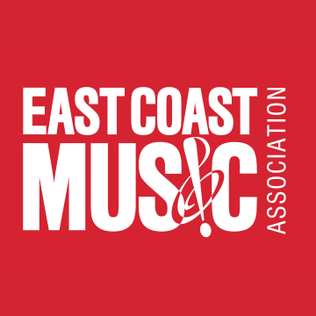
The East Coast Music Association (ECMA) is a non-profit association purposed towards supporting the music industry in the Canadian east coast, i.e., Atlantic Canada. The ECMA hosts the annual East Coast Music Awards festival.

David Myles is a Canadian songwriter and musician born in Fredericton, New Brunswick. Myles lives in Fredericton, New Brunswick, as of September 2020, moving from Halifax, Nova Scotia. His music has often been labeled folk jazz, although he prefers simply to call it "roots" music. An independent artist who self-releases his albums, Myles has been able to gain an increasingly large audience, in part because of his active touring schedule and in part because of his cross-genre musical collaborations, which include a single made with the rapper Classified that became the biggest-selling rap single in the history of Canadian music.

Nova Scotia is a Canadian province located in Canada's Maritimes. The region was initially occupied by Mi'kmaq. The colonial history of Nova Scotia includes the present-day Maritime Provinces and the northern part of Maine, all of which were at one time part of Nova Scotia. In 1763, Cape Breton Island and St. John's Island became part of Nova Scotia. In 1769, St. John's Island became a separate colony. Nova Scotia included present-day New Brunswick until that province was established in 1784. During the first 150 years of European settlement, the colony was primarily made up of Catholic Acadians, Maliseet, and Mi'kmaq. During the last 75 years of this time period, there were six colonial wars that took place in Nova Scotia. After agreeing to several peace treaties, the long period of warfare ended with the Halifax Treaties (1761) and two years later, when the British defeated the French in North America (1763). During those wars, the Acadians, Mi'kmaq and Maliseet from the region fought to protect the border of Acadia from New England. They fought the war on two fronts: the southern border of Acadia, which New France defined as the Kennebec River in southern Maine, and in Nova Scotia, which involved preventing New Englanders from taking the capital of Acadia, Port Royal and establishing themselves at Canso.

The Battle of Blomidon took place on 21 May 1781 during the American Revolutionary War. The naval battle involved three armed U.S. privateer vessels against three Nova Scotian vessels off Cape Split, Nova Scotia. American Privateers caught two Nova Scotia Vessels. The first Nova Scotia vessel was re-captured by Lieut Benjamin Belcher. The second Nova Scotia vessel was overtaken by the captured crew under the command of Captain Bishop. The privateers were taken to Cornwallis and put on trial.
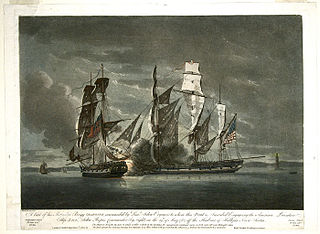
The Province of Nova Scotia was heavily involved in the American Revolutionary War (1776–1783). At that time, Nova Scotia also included present-day New Brunswick until that colony was created in 1784. The Revolution had a significant impact on shaping Nova Scotia, "almost the 14th American Colony". At the beginning, there was ambivalence in Nova Scotia over whether the colony should join the Americans in the war against Britain. Largely as a result of American privateer raids on Nova Scotia villages, as the war continued, the population of Nova Scotia solidified their support for the British. Nova Scotians were also influenced to remain loyal to Britain by the presence of British military units, judicial prosecution by the Nova Scotia Governors and the efforts of Reverend Henry Alline.
Keonte Beals is a Canadian R&B singer and author from North Preston, Nova Scotia.
African Nova Scotian Music Association (ANSMA) is a non-profit organization purposed towards supporting African Nova Scotians in the music industry.
References
- ↑ "ECMA Announces The Bucky Adams Memorial Award - East Coast Music Association". Ecma.com. 2015-12-14. Retrieved 2022-10-22.
- ↑ "Charles Adams Obituary - Halifax, NS". Dignitymemorial.com. 2012-07-24. Retrieved 2022-10-22.
- ↑ Barnard, Elissa (14 July 2012). "Offered a job by B.B. King, Adams chose to stay home". The Chronicle Herald . pp. C9, C10 . Retrieved October 22, 2022– via Newspapers.com.
- ↑ "Bucky Adams (2)". Discogs. Retrieved 22 October 2022.
- ↑ "» Died On This Date (July 13, 2012) Bucky Adams / Canadian Jazz Legend The Music's Over". Themusicsover.com. 2012-07-13. Retrieved 2022-10-22.
- 1 2 "N.S. jazz legend 'Bucky' Adams, 75, has died". cbc.ca. Retrieved 22 October 2022.
- 1 2 Cooke, Stephen (25 July 2012). "Celebration of life and song". The Chronicle Herald . pp. A1, A2 . Retrieved October 22, 2022– via Newspapers.com.
- ↑ "Adams, Bucky & Basin Street - At Privateers' Warehouse". Citizenfreak.com. Retrieved 2022-10-22.
- ↑ "Adams, Bucky & Basin Street". Citizenfreak.com. Retrieved 2022-10-22.
- ↑ "Adams, Bucky & Basin Street".
- ↑ "Canada Lost Prominent Citizens - Newspapers.com™". newspapers.com. Retrieved 2024-05-08.
- ↑ "Charles (Bucky) Adams | The Governor General of Canada". Gg.ca. Retrieved 2022-10-22.
- ↑ "Nova Scotia Folk Singer Rose Cousins Wins Three East Coast Music Awards - Newspapers.com™". newspapers.com. Retrieved 2024-05-08.